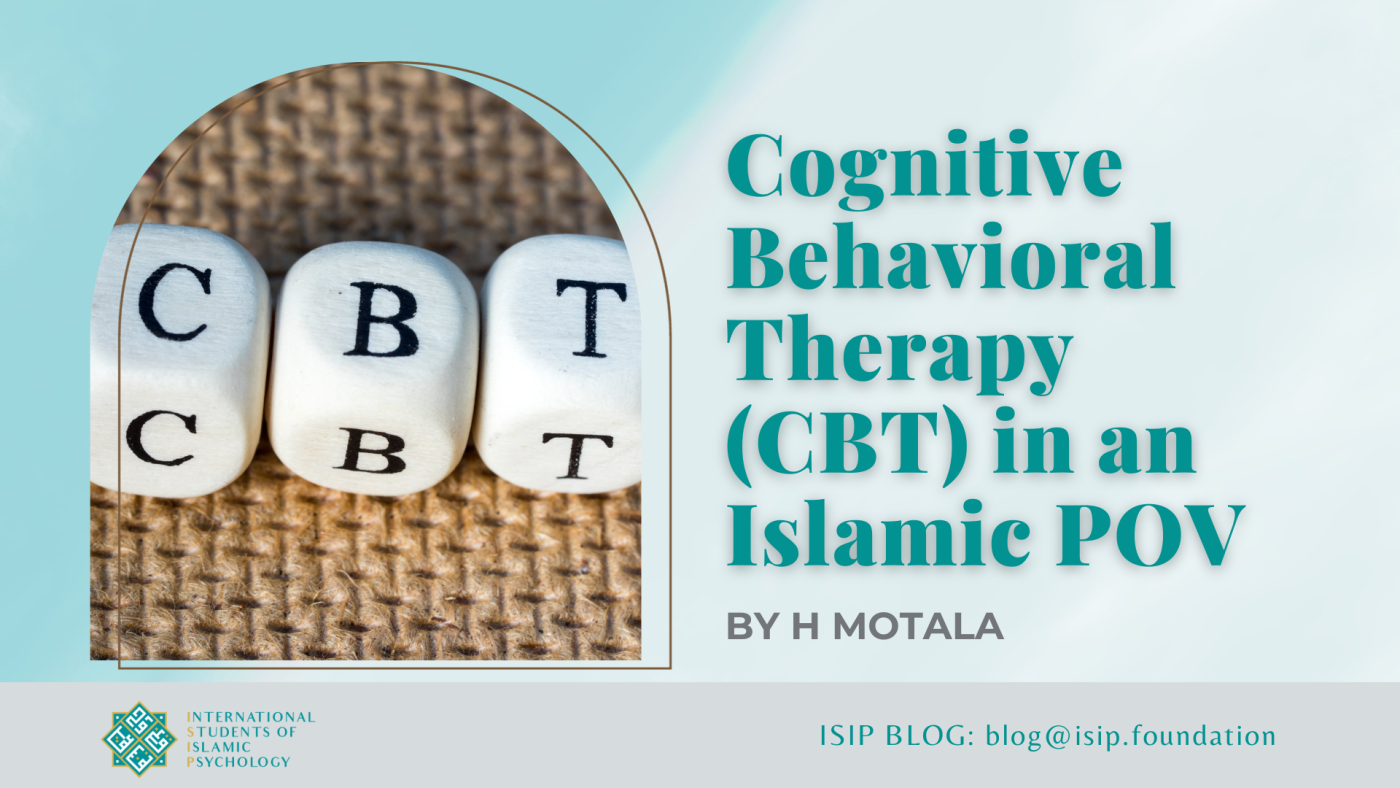
BY H MOTALA
Cognitive Behavioral Therapy, CBT, is a widely practiced and highly effective approach to psychotherapy that has transformed the landscape of mental health treatment. Rooted in the belief that our thoughts, feelings, and behaviors are interconnected, CBT seeks to empower individuals to understand and manage their emotional well-being by exploring and modifying their thought patterns and behaviors. CBT is based on the premise that our thoughts, feelings, and behaviors are interconnected, and by identifying and modifying negative thought patterns, we can improve our mental well-being. In this article, we will explore CBT from an Islamic perspective, emphasizing its compatibility with Islamic teachings and its potential to enhance the psychological and spiritual well-being of individuals.
CBT is rooted in the idea that our thoughts shape our emotions and behaviors. It encourages individuals to recognize and challenge irrational or negative thought patterns, replacing them with more rational and positive ones. The ultimate goal is to alleviate emotional distress, promote healthier coping mechanisms, and improve overall mental health.
Islamic Foundations of CBT
- Self-Reflection: Islam places a significant emphasis on self-reflection and self-awareness. The Quran encourages believers to ponder the signs of Allah in the universe (Surah Al-Imran, 3:191) and reflect on their own souls (Surah Al-Hashr, 59:18-19). CBT aligns with this principle by urging individuals to reflect on their thoughts and emotions, fostering greater self-awareness. They are those who remember Allah while standing, sitting, and lying on their sides, and reflect on the creation of the heavens and the earth and pray, “Our Lord! You have not created all of this without purpose. Glory be to You! Protect us from the torment of the Fire.
“Our Lord! You have not created all of this without purpose. Glory be to You! Protect us from the torment of the Fire.
(Surah Al-Imran, 3:191)
O Believers! Be mindful of Allah and let every soul look to what deeds it has sent forth for tomorrow. And fear Allah, for certainly Allah is All-Aware of what you do. And do not be like those who forgot Allah, so He made them forget themselves. It is they who are truly rebellious.
(Surah Al-Hashr, 59:18-19)
- Accountability: In Islamic teachings, individuals are accountable for their actions, intentions, and even their thoughts. CBT reinforces this concept by helping individuals take responsibility for their thought patterns and behaviors, enabling them to make positive changes.
- Patience and Perseverance: Islam teaches patience and perseverance in the face of adversity. CBT often requires time and effort to yield results, promoting the virtue of patience in individuals seeking mental well-being.
- Trust in Allah: While CBT emphasizes self-help techniques, it also encourages individuals to acknowledge their limitations and place trust in a higher power. In Islam, placing trust in Allah
(Tawakkul) is a fundamental principle. Combining CBT with Tawakkul can provide a balanced approach to addressing mental health issues.
CBT Techniques from an Islamic Perspective
- Positive Affirmations: Incorporating positive affirmations based on Quranic verses and Hadith can reinforce positive thought patterns. For example, reciting (“Allah alone is sufficient as an aid for us and He is the best Protector.) from (Surah Al-Imran, 3:173) can instill trust and hope in times of distress.
- Gratitude Journaling: Keeping a gratitude journal, a common CBT technique, can align with Islamic teachings on gratitude (Shukr). Muslims are encouraged to be grateful for Allah’s blessings and acknowledge them regularly.
- Mindfulness and Salah: Mindfulness practices, such as deep breathing and meditation, are integral to CBT. These practices can be combined with the five daily Salah (prayers), allowing individuals to connect with their faith and find peace and serenity in their daily lives.
- Seeking Knowledge: Islam places great importance on seeking knowledge. Individuals undergoing CBT can benefit from gaining a better understanding of the therapy’s principles and techniques to actively participate in their healing process.
Cognitive Behavioral Therapy is a valuable tool for improving mental health and well-being. From an Islamic perspective, it aligns with many core teachings of Islam, including self-awareness, accountability, patience, trust in Allah, and gratitude. By integrating CBT techniques with Islamic principles, individuals can work towards achieving better mental and emotional health while staying rooted in their faith. Ultimately, seeking professional guidance and support, when necessary, is essential to ensure a holistic approach to mental well-being

Beautifully expressed, at many places Quran emphasizes on self reflection, patience and changing our way of thinking. Like in Surah Duha, which restores our faith, informs about Allah is watching and will provide, and one of my favourite aayat from Surah Baqarah, ayat 153, O believers! Seek help in patience and prayer, Allah is with those who are patient. Using many of such verses with stories of the various Prophets can help us rewire our thoughts with optimism, increase our resilience and make us act morally appropriately. Really glad to read this.
Thanks for the article
Alhamdulillah. MashaAllah. Hope we will see more articles such as this where instead of taking side (either islamic psychology or modern psychology), we see beauty and find the connection in Islam with the current mainstream practices. Sometimes just a little shift in perspectives brings better appreciation, deeper understanding and hopefully takes us a step closer to Him in our mainstream daily mental health practices.